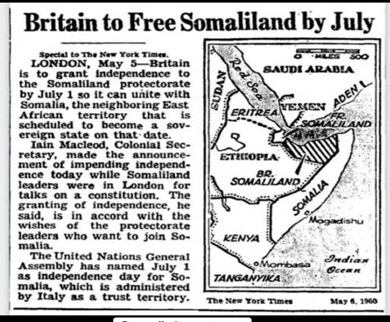By Ali H. Abdulla
The quest for international recognition by Somaliland has been a contentious issue in the Horn of Africa since it declared its unilateral independence from Somalia in 1991. Its false claims to relative stability and democratic credentials compared to the rest of Somalia have been shattered by recent events, particularly the shelling of Las Anod, and cast a shadow over its claims for statehood.

The humanitarian impact of these actions necessitates a re-evaluation of Somaliland’s bid for recognition as an independent state as called for by the Heritage Foundation in its collection of conservative policy proposals to reshape the United States federal government in the event of a Republican Party victory in the 2024 presidential election.
The Shelling of Las Anod: A Humanitarian Crisis
In early 2024, reports emerged detailing the shelling of Las Anod, the capital city of the regions inhabited by Somali clans who want to remain within the Federal System being recognized by the international community. This assault by Somaliland forces resulted in significant civilian casualties and the displacement of thousands of residents. The indiscriminate nature of the shelling, which targeted residential areas and critical infrastructure, raises severe ethical and legal concerns. This is not the first time that the democratic Somaliland resorted to violence to counter opposition to its illegal one-sided secession. In 1994, a brutal civil war broke out in Brurao and Hargeisa between unionist-leaning clans and the administration dominated by clans pushing to break away from Somalia. The conflict lasted for several years and resulted in the loss of thousands of lives.
The aftermath of the current conflict in Las Anod has been devastating: homes destroyed, families separated, and an acute humanitarian crisis emerging as displaced persons lack access to essential services like food, water, and medical care. The international community has condemned these actions, but the immediate needs of the displaced population remain dire.
Violation of International Law and Human Rights
The deliberate targeting of civilian populations in conflict zones is a violation of international humanitarian law, specifically the Geneva Conventions. Somaliland’s actions in Las Anod breach these conventions, undermining its claim as an entity that respects international norms. This blatant disregard for human rights erodes the moral high ground that Somaliland has often claimed in its pursuit of recognition.
Furthermore, the use of heavy artillery in populated areas without distinction between combatants and non-combatants demonstrates a severe lack of adherence to the principles of proportionality and necessity, core tenets of the laws of armed conflict. Such conduct not only discredits Somaliland’s governance and democracy but also raises questions about its commitment to peaceful conflict resolution and protection of human rights.
Political Implications and Regional Stability
Recognizing Somaliland as an independent state under these circumstances could set a dangerous precedent. It would signal that entities seeking statehood might achieve their goals despite engaging in actions contradicting international laws and norms. This could encourage other separatist movements to resort to violence, destabilizing already fragile regions.
The crisis in Las Anod also exacerbates regional tensions, particularly with Puntland, whose clans are affiliated with the unionist clans in Las Anod. The escalation of violence threatens broader regional stability, complicating efforts to achieve lasting peace and security in the Horn of Africa. Recognizing Somaliland now could undermine these efforts, fostering further conflict and division.
Ethical and Moral Considerations
The international community must weigh the ethical and moral implications of recognizing Somaliland. Endorsing an entity responsible for such severe human rights violations would be contrary to the principles that underpin the international order. Human dignity, respect for human rights, and adherence to international law are non-negotiable standards that must be upheld.
Somaliland’s actions in Las Anod reveal significant shortcomings in governance, respect for human rights, and commitment to peaceful conflict resolution. These are critical criteria for statehood that Somaliland fails to meet.
Lack of credible arguments for Recognition
Historical records indicate that various clans in Somaliland signed protection agreements with the British in the late 19th and early 20th centuries. However, evidence suggests that the Las Anod clans were not among those who signed such contracts.

The contemporary political implications of this history are evident in the stance of unionist clans on Somaliland’s secession. These clans have opposed Somaliland’s unilateral declaration of independence from Somalia, arguing that they did not consent to the original British-Somaliland agreement and should not be compelled to join Somaliland against their will.
This historical argument supports the position that the unionist clans should have the autonomy to decide their political future independently of Somaliland’s secessionist agenda. The complexity of clan dynamics and historical agreements continues to influence the political landscape in the region, highlighting the need for a negotiated solution that respects the diverse historical experiences and aspirations of all communities involved.
Somaliland argues that it was a recognized state that gained independence from Britain on 26 June 1960 before voluntarily uniting with Southern Somalia. However, the New York Times reported on May 6, 1960, that “the British were to grant independence to its Somaliland protectorate on July 1 so that it could unite with Somalia. This neighboring East African territory was scheduled to become a sovereign state on that date.” This proves that there was no independent state called Somaliland before the Union.
Somaliland cannot justify its indiscriminate shelling of innocent civilians demonstrating against a forced secession while seeking unilateral withdrawal from a Somali Union established by all the Somali clans more than 60 years ago.
The democratic façade that Somaliland uses to convince the international community is marketed to the world by the likes of Dr. Edna, a former first lady of Somalia and a current advocate for Somaliland’s recognition. She loves to paint Somaliland as a stable democratic enclave compared to Somalia which is teeming with terrorists and pirates. However, she always omits essential facts: that there are clans in Northern Somalia who have no desire to join Somaliland in its quest for recognition; that not all residents of Southern Somalia are terrorists or pirates; and that her nephew, Ahmed Abdi Godane, was the Emir(Leader) of the Al-Shabab movement in Somalia before being killed by a US drone strike in 2014.
There is a strong possibility that the current president of Somaliland, Muse Bihi, will resort to violence if he loses the upcoming presidential election in November. His dictatorial tendencies are demonstrated by the recent arrest of Osman Omar Dool, a Somaliland activist when he arrived in Hargeisa to attend the wedding of his daughter. His guilt evolved around the fact that he insulted the president and spoke against the Las Anod shelling. His arrest strangely coincided with the same day that a US Congressional Staff delegation sent by a conservative group lobbying for Somaliland recognition was leaving Hargeisa.
Conclusion
While the Heritage Foundation wrongly believes that Somaliland has made notable strides in governance and stability compared to the rest of Somalia, the recent shelling of Las Anod underscores severe flaws in its bid for independence. The humanitarian crisis, violations of international law, and potential regional destabilization argue compellingly against recognition. The international community must prioritize the protection of civilians and adherence to international norms over political expediency, ensuring that actions like those in Las Anod are met with accountability, not endorsement.
Former President Trump turned out to be right in his opposition to the Iraq War. It cost trillions and created a new reality counterproductive to US interests in the area. It ended up empowering the Shia Crescent that extends from Iran to Lebanon and now to Yemen. If he wins the election in November, he should reject the recommendations of the Heritage Foundation that could lead to worsening the current situation in Somalia. The recognition of Somaliland will be a God-sent opportunity for Somali extremists who will be able to recruit more extremists. The call by ill-informed foreigners to recognize Somaliland is equivalent to taking sides in a local dispute, which can have negative implications for the region.
Somaliland recognition will also empower and encourage it to use force against any clan that opposes its independence claims, leading to the displacement of thousands in a conflict that engulfs the Horn of Africa.
Ali H. Abdulla
Email: aliegeh@gmail.com

Leave a Reply